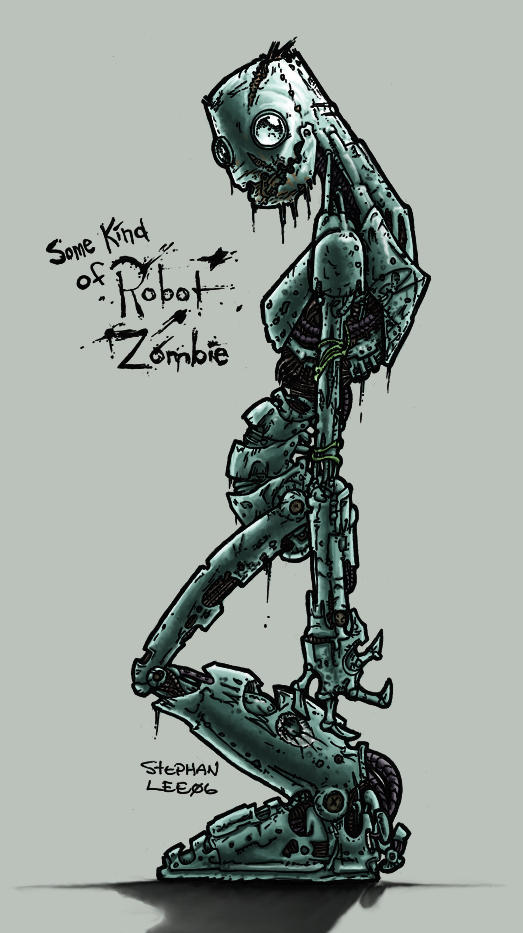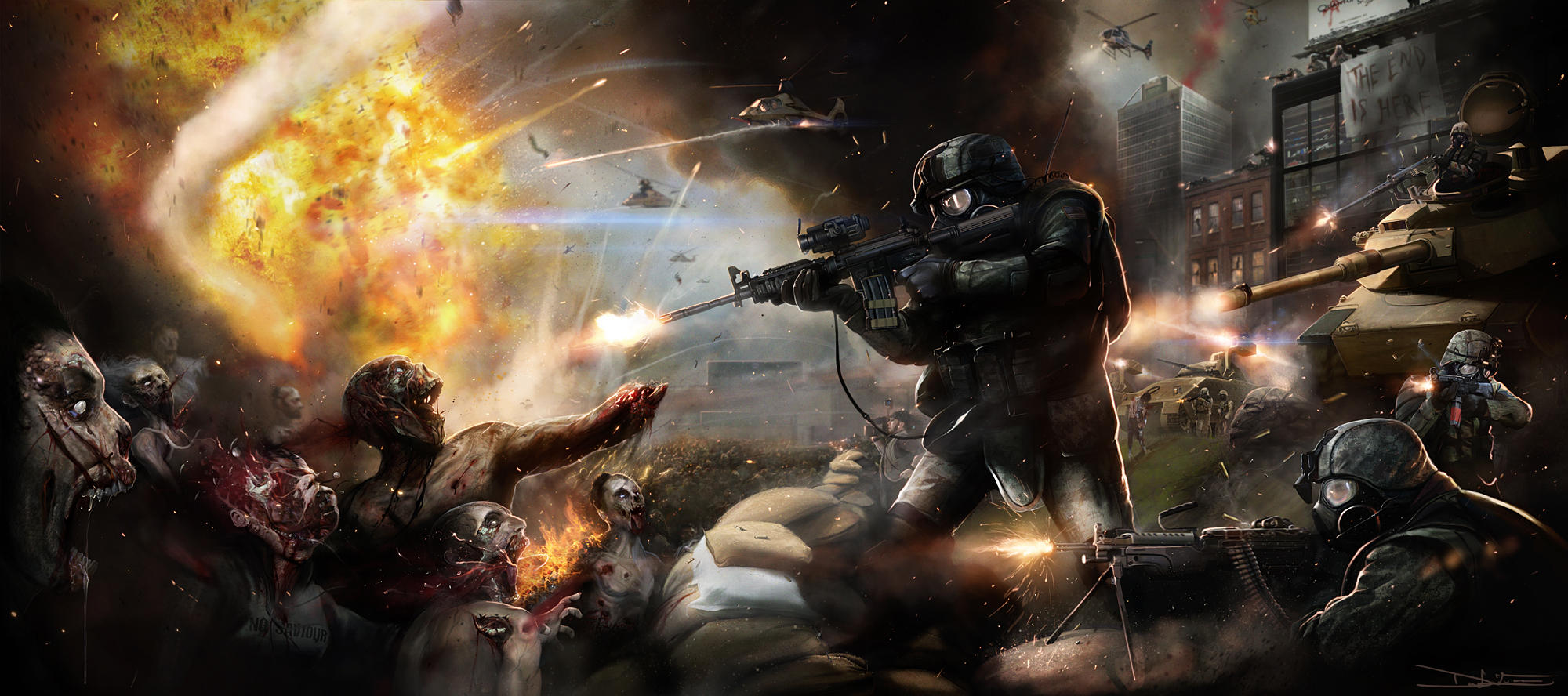 |
Zombie by *hokunin |
I love Zombie novels and in general apocalypse novels. I
love to see how people react when society breaks down, and I like to see them
survive. Hope is a big aspect of these stories, and they often leave me
reevaluating my own troubles. It’s hard to read or watch one of these stories
without thinking, “What would I do?” Typically, it’s a safe read, and you don’t
get too sucked in to the possibility of it because Zombies are kind of bogus
monsters—I am pretty confident there isn’t much possibility of a Zombie apocalypse
ever taking hold.
 |
Some Kind of Robot Zombie
|
It’s more the robots I worry about.
As I was thinking over the recent obsession people seem to
have with zombies, from games to books and movies, one thing in particular did
come to mind as an explanation for it. I think in many ways our love of the zombie
apocalypse stems from the over domestication of the modern man. It reminds me
of why I loved Fight Club so much (the book, though the movie was decent too).
In Fight Club, the main characters are rebelling against what they consider the
feminization of man, which results in things like the Ikea nesting instinct,
where comfort and the things you own define you.
Just like those men who signed up to follow Tyler Durden, a zombie
apocalypse presents a stage where men can be men, where everything goes back to
its basest levels of survival. One could even say that society would revert to
a time when life was meaningful, where survival and procreation depended on skill, and the raw power and intelligence of an individual. This would be a huge
change from where we are now, with everything we encounter in life being “user
friendly” or “idiot proof,” and rather than concern over the continuation of the
species, we hear daily about the horrors of overpopulation and the need for more
birth control. Just think about that phrase a moment, “Birth Control.” Birth,
alongside death, is the most natural thing in our world, and yet we find
ourselves in a time when it is necessary to control that, to defy our very
nature.
 |
WWZ - The Battle of Yonkers - by `adonihs |
When the apocalypse comes, and our numbers have dwindled,
sex, and everything that comes with it, will once again be a necessity…not a
vice. These natural instincts to hunt, to kill, to fight and forage and fuck, will have great value again, where as now they are viewed as the darker
side of humanity. A side that, intellectually, we’ve determined to be detrimental to
modern society. Apocalypse stories allow us to romanticize and indulge in the
very behaviors we start learning to suppress as early as kindergarten.
I have to admit, there is a part of me that enjoys thinking
about how survivalists, soldiers,
game hunters and those others on the fringe of society who have been
told that their way of life and proclivities are counterproductive to society,
would fare compared to the tender hearted and liberal minded. I think at the
very least, I would get on a lot better than the targeted audience of most infomercials.
That said, I enjoyed reading World War Z, but I don’t know
if I would classify it as a novel. There wasn’t a central plot, no character
arcs, just the stories of those who survived. The problem with a story told
after the fact is that any sense of immediacy or danger is removed. There is no
suspense. What it offered in exchange, however, was realism. Politics aside, it
was well researched and thought out, and seemed very much like true accounts. It
almost made me think of an epilogue to all the zombie stories that are floating
around today—a deep step back to see, not how a small cluster of humans
survived, but how the world survived. I loved that! In all the zombie
movies I have watched, and the books I have read, I was always left wondering
what was going on in the rest of the world? Where was the government
involvement, and most importantly, what came after? WWZ answers a lot of those
questions in a highly insightful and wholly satisfying way.


5 comments:
When it comes to whether or not it qualifies as a novel, I would have to say based on your stated characteristics it does. It has the required elements of Freytag’s pyramid and almost every character is changed in some way by the war. Even entire countries are changed, like Cuba gaining its freedom and the religious fervor overwhelming the Holy Russian Empire.
The central plot is the war with the zombies. The first section traces the spread of the disease from Patient Zero in China to Palestine. The next section continues to track the spread of the illness. Along with the illness, it discusses actions by the government and pharmaceutical companies that enable the disease to spread quickly and further while the public remains unaware.The spread of the disease could be considered rising action, since it worsens as the plot progresses.
During the “Great Panic,” things escalate to a climactic moment when the crisis can no longer be denied, ignored or hushed up. This section records initial reactions and crisis, or the peak of Freytag’s pyramid. It is a major turning point and begins what I see as the second part of the novel which is overcoming the obstacle by successfully reclaiming territory and beginning the healing process.
Once they realize there is a problem, they begin deciding what actions to take in “Turning the Tide.” They begin to have success when fighting back and begin rebuilding. This could be considered falling action since the zombies are no longer winning. The situation is slowly being reconciled. They have a new approach: to stand and fight. Home Front USA focuses on the actions of America and Around the World, and Above focuses on the rest of the plant and outer space.
It concludes with the decision to fight back to reclaim land. In essence, they people decide not to hide and avoid the situation anymore. “Total War” chronologically depicts whether or not reclaiming the land is successful. Brooks also reintroduces a few of the characters to update on what is happening to them. In
In “Goodbyes” the fates of most of the main characters are revealed. In addition, the themes of the story are summarized.
This plot structure wasn’t obvious in my first reading, but became clearer as I reviewed my notes for my blog post.
As for character arcs, all the characters go through a similar process of change. They deny the zombie attacks, allow themselves to accept the situation, begin to fight back and eventually reclaim their land from the enemy. Countries begin fighting each other and end up working together and cooperating. That's another change the characters undergo.
Just about every person interviewed changes in some way as a result of the trauma.
A more specific example is Darrell Hackworth, a handler in “Total War,” who explains how he hated dogs at the beginning of the war. One day he attacked some recruiters to save a dog and is recruited as a handler. He ends up loving dogs which is obvious when he lowers his voice, and caresses the dog“Maze,” proof of the tight bond they have.
Another obvious example is Sensei Tomonaga Ijiro, the blind man in Japan. He starts out horribly depressed and an outcast. He has an epiphany and realizes his life has a purpose. He changes almost completely from hopeless to hopeful and from outcast to hero.
I don’t know. To me it read like a collection of short stories, more like episodes of out these peoples' lives. I think what he did was remarkable and interesting, but I just don’t see it as a “novel.” I know a lot of people who have started to read the book and quit in the first couple of interviews because it wasn’t structured as a “novel.” I'm not in any way saying it's bad, it's just different, purposefully different.
The first time I read it I put it down because I expected it to be a true novel. I was so disappointed I thought that I hated it, and didn't pick it back up for over a year. I revisited it recently and was glad I did. It is essentially an anthology of short shorts in order but I would also say this is not a novel.
I agree that the central plot of the story is the war against zombies... and I also must agree with one of Shannon's earliest comments... that the Zombie is a bit of a bogus monster.
It's written in a documentary style reminiscent of a large number of World War II books on my shelf (first hand accounts from the World Wars make exceptionally good reading and source material.) It's a fake documentary really, and that I think is why it works so well... everything sounds at least somewhat believable.
Except the Zombies.
I think you hit the nail on the head. And I love your Robot Zombie. You're right. It's the computers we really need to watch out for. ;)
The realism of this book is its strength, I think. But it's also what takes away from its fiction "novel" feel. I also felt a bit cheated at times. It was a great book. Brilliantly executed. But when I sit down to read I want entertainment--not a history lesson.
Post a Comment